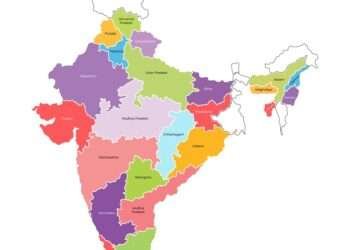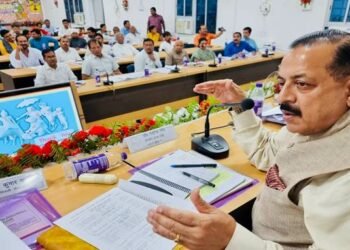By Vikas Parasram Meshram
On September 27, 2021, farmers’ unions called for a shutdown in India, which was also supported by several political parties. The closure came as a shock to many in the establishment as farmers in the country do not call for a daily shutdown. Let’s see what the figures say about the way farmers in the country have been agitating for three laws for a long time.
If you look at the figures released by the National Crime Records Bureau, there were about 2,188 cases of peasant agitation in 2020, and when the whole country is currently facing a coronavirus epidemic. The figure was 1,579 in 2019, meaning there has been a nearly 38 percent increase in protests over this one year. This information has come to light in the report of The Crimes in India 2020 published in September 2021.
Farmers, mainly from Punjab, Haryana and Uttar Pradesh, have been protesting in Delhi for the past 10 months against three controversial agricultural laws passed last year. The three controversial laws passed by the government include the first Farmers Product Trade and Commerce (Promotion and Facilitation) Bill, 2020, the second Farmers (Empowerment and Protection) Price Guarantee and Agricultural Services Bill 2020 and the third Bill. Commodity Amendment Act.
The analysis shows an increase in the number of protests in 2020. In 2016-17, the number of farmers’ demonstrations was about 31 per cent less than the previous year. At the same time, the deficit was reported to be around 40 per cent in 2017-18 and 21.4 per cent in 2018-19. If we talk about the protests in 2020, Bihar alone recorded about 1,286 incidents, the highest in the country. It was followed by Maharashtra with 148 incidents (three times increase), Karnataka with 148 incidents, Uttar Pradesh with 142 incidents and Jharkhand with 83 incidents. At the same time, the number of protests in Tamil Nadu has tripled.
The growing dissatisfaction among farmers during 2020 has been seen in a much wider area compared to previous years. The NCRB figures show a similar trend.
According to the NCRB, the number of states registering farmers ’movements has increased from 12 to 15 in 2020 compared to 2020. Notably, in 2020, the three new states that were opposed by the farming community are Haryana, Andhra Pradesh and Himachal Pradesh. However, the NCRB’s statistics on farmers ’agitations do not include some of the states where farmers were seen agitating last year. Thus, this report does not present a completely clear picture that needs to be improved. In 2020, farmers in Assam, Goa, Kerala, Manipur, Punjab, Rajasthan, Tripura, Telangana and West Bengal also protested against government policies and new agricultural laws, but the NCRB report does not take into account the protests in these states.
If you look, the farmers of Punjab, along with the farmers of Uttar Pradesh and Haryana, are also at the forefront of the nationwide agitation starting from June 2020.
Nationwide farmer movement may set new record in 2021 According to a 2021 report released by the Center for Science and Environment (CSE), in 2021, farmers in at least 22 states and union territories have come out to protest against these agricultural laws.
The annual report, compiled based on media reports, said most of the protests were over three controversial agricultural laws, state laws, budget allocations for the agricultural sector, market and price differences and higher base prices for crops.
The United Nations has expressed concern over how the government is looting billions of dollars from farmers.
According to a recent report by the United Nations, the policies of the Government of India have closed all avenues for farmers so that they can provide relief to consumers by keeping food prices low. During the farmers ‘movement against India’s agricultural laws, a recent report by a UN agency found that India is a strange country whose government punishes its farmers instead of encouraging them like other countries’ governments.
Ahead of the World Food Conference on September 23, the three United Nations agencies, the Food and Agriculture Organization (FAO), the United Nations Development Program (UNDP) and the United Nations Environment Program (UNEP) released a report entitled “A Multi Billion Dollar Opportunity”. In this. The World Food Conference is expected to take “bold steps” to improve food security globally. It will be seen as part of efforts to accelerate the UN’s 17 Sustainable Development Goals. The report further states that special efforts are needed to improve the food system. Especially those countries that have adjusted the prices of agricultural products for farmers and encouraged agriculture to contribute to global warming by increasing emissions. It also analyzes the efforts made by governments for farmers and their impact on these dimensions. According to the report, the government spends 540 billion annually in the name of improving agriculture. More than half of this amount is used in the name of cost depreciation, which has a profound negative impact on the environment.
However, the way to improve agriculture is different in the countries of the world. Developed countries encourage their farmers to participate in global competition to get better prices for their produce. Even developing and emerging economies help their farmers in many ways.
On the other hand, government assistance to farmers in low-income sub-Saharan African countries is negative. This is because these countries lack economic resources, which prevents the government from raising the prices of agricultural products to reduce the prices of food products. Farmers who grow it never get a fair price for their crops. It is a punishment for them. In the language of policies, this is known as ‘tax’ collected from farmers.
India is an exception among middle-income countries. According to the report, “For the last twenty years, agricultural policies in India have been such that farmers have to bear the brunt of consumerism without raising food prices. ‘
Analysis of the report shows how other middle-income countries in the world have helped their farmers by supporting them. It is a different matter that they adopted different measures for this. So while India, Argentina and Ghana are on their way, they believe in taxing farmers and protecting the interests of consumers. The government is pursuing this loophole policy to prevent food inflation and keep it out of the reach of the common man.
On the other hand, the fact that India and some other middle-income countries have been slashing food prices to control food prices over the past two decades has put a strain on farmers and thus focused more on the policy of penalizing farmers.
The Producer Support Assessment ‘method is used internationally by the government to support producers through budgets and other subsidies. Developed by the Organization for Economic Co-operation and Development (OECD), the method is a global effort every year to find out what steps governments around the world are taking to help farmers. Is. This cost farmers 23 23 billion in 2019.
“Yes, it is true that, as the report suggests, farmers are punished in countries like India,” said Marco V. Sanchez, deputy director of the Food and Agriculture Organization of the United Nations Food and Agriculture Organization. Even so, schemes like cash transfers send Rs 6,000 a year to farmers’ accounts in India under the PM-Kisan scheme, but the important question is whether they are adequate.
A recent United Nations report defines agricultural producer support as a concerted effort to provide individual assistance to farmers. This includes both the benefits and subsidies they get on the price of agricultural products. For the same reason, the UN report uses the term ‘nominal aid’ to refer to helping farmers.
Other factors that have contributed to the growing dissatisfaction include unavailability of essential commodities such as fertilizers and irrigation facilities and price hikes, inadequate compensation for land taken in the name of development projects, bogus grants of insurance companies, late compensation. As per the media reports, the ‘Bharat Bandh’ held a year after the passage of the Agriculture Bill was most successful in Punjab, where protesters had gathered from at least 350 places.
(Vikas Parasram Meshram is a social sector leader.)
Views are personal.






















